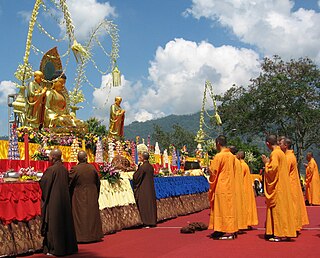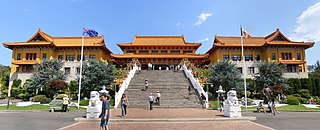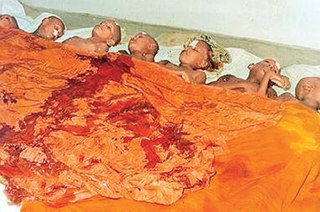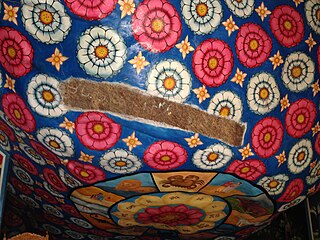
Vesak, also known as Wesak, Buddha Purnima and Buddha Day, is a holiday traditionally observed by Buddhists and some Hindus on different days in India, Sri Lanka, Nepal, Tibet, Bangladesh, Bhutan, Indonesia, Singapore, Thailand, Cambodia, Laos, Malaysia, Myanmar, Mongolia and the Philippines and in China, Japan, South Korea, North Korea, Taiwan and Vietnam as "Buddha's Birthday" as well as in other parts of the world. The festival commemorates the birth, enlightenment (Buddhahood), and death (Parinirvāna) of Gautama Buddha in the Theravada or southern tradition.

Theravada Buddhism is the State religion of Sri Lanka practiced by 70.2%. Buddhism has been given special privileges in the constitution and also declared country's official religion by 2nd president of sri Lanka J.R Jayawardene. Sri Lanka is traditionally oldest religious Buddhist country where Buddhist aryan culture is protected and preserved. The island has been a center of Buddhist scholarship and learning since the introduction of Buddhism in the third century BCE producing eminent scholars such as Buddhaghosa and preserving the vast Pāli Canon. Throughout most of its history, Sri Lankan kings have played a major role in the maintenance and revival of the Buddhist institutions of the island. During the 19th century, a modern Buddhist revival took place on the island which promoted Buddhist education and learning. There are around 6,000 Buddhist monasteries on Sri Lanka with approximately 15,000 monks.
The constitution of Sri Lanka states under Chapter II, Article 9, "The Republic of Sri Lanka shall give to Buddhism the foremost place and accordingly it shall be the duty of the State to protect and foster the Buddha Sasana, while assuring to all religions the rights granted by Articles 10 and 14(1)(e)." Articles 10 and 14(1)(e) provide all citizens the freedom to adopt, practice and teach any religion of their choice. Concurrently in 1978, Buddhism was declared as the State religion by President J. R. Jayawardene. This preferential treatment to Buddhism is therefore highly controversial in Sri Lanka, and is seen as the prime factor in the rise of Tamil separatism.

Upāsaka (masculine) or Upāsikā (feminine) are from the Sanskrit and Pāli words for "attendant". This is the title of followers of Buddhism who are not monks, nuns, or novice monastics in a Buddhist order, and who undertake certain vows. In modern times they have a connotation of dedicated piety that is best suggested by terms such as "lay devotee" or "devout lay follower".

The culture of Sri Lanka mixes modern elements with traditional aspects and is known for its regional diversity. Sri Lankan culture has long been influenced by the heritage of Theravada Buddhism passed on from India, and the religion's legacy is particularly strong in Sri Lanka's southern and central regions. South Indian cultural influences are especially pronounced in the northernmost reaches of the country. The history of colonial occupation has also left a mark on Sri Lanka's identity, with Portuguese, Dutch, and British elements having intermingled with various traditional facets of Sri Lankan culture. Additionally, Indonesian culture has also influenced certain aspects of Sri Lankan culture. Culturally, Sri Lanka, particularly the Sinhalese people, possesses strong links to both India and Southeast Asia.
Sri Lankan Australians refers to people of Sri Lankan heritage living in Australia; this includes Sri Lankans by birth and by ancestry. Sri Lankan Australians constitute one of the largest groups of Overseas Sri Lankan communities and are the largest diasporic Sri Lankan community in Oceania. Sri Lankan Australians consist of people with Sinhalese, Tamil, Moor, Burgher, Malay and Chinese origins among others.

In Australia, Buddhism is a minority religion. According to the 2016 census, 2.4 percent of the total population of Australia identified as Buddhist. It was also the fastest-growing religion by percentage, having increased its number of adherents by 79 percent between the 1996 and 2001 censuses. Buddhism is the third largest religion in the country after Christianity and Islam.

Buddhist Maha Vihara, Brickfields is a Buddhist site founded by the Sinhalese community based in the areas surrounding Kuala Lumpur to provide a place of worship in the Sri Lankan Theravada Buddhist tradition. It is also commonly known as the Brickfields Buddhist Temple. The Buddhist Maha Vihara’s growth and flourish over the past 50 years is attributed to the guidance and efforts of Ven. Dr. K. Sri Dhammananda whose vision is to enable a Malaysian Buddhist community to practice their beliefs in a caring and sufficient environment.

Yapahuwa was one of the ephemeral capitals of medieval Sri Lanka. The citadel of Yapahuwa lying midway between Kurunagala and Anuradhapura was built around a huge granite rock rising abruptly almost a hundred meters above the surrounding lowlands.

Eight sites of Sri Lanka have been inscribed in the UNESCO World Heritage, namely, the ancient city of Polonnaruwa (1982), the ancient city of Sigiriya (1982), the Golden Temple of Dambulla (1991), the old town of Galle and its fortifications (1988), the sacred city of Anuradhapura (1982), the sacred city of Kandy (1988), Sinharaja Forest Reserve (1988) and the Central Highlands of Sri Lanka (2010).

The Aranthalawa massacre was the massacre of 33 Buddhist monks, most of them young novice monks, and four civilians by cadres of the rebel Liberation Tigers of Tamil Eelam organization on June 2, 1987, close to the village of Aranthalawa, in the Ampara District of Eastern Sri Lanka. The massacre is considered one of the most notorious and devastating atrocities committed by the LTTE during the history of the Sri Lankan Civil War, and continues to be commemorated 20 years on.
Saddha Tissa was a monarch of the Kingdom of Anuradhapura, based at the ancient capital of Anuradhapura from 137 BC to 119 BC. Saddha Tissa was the son of Kavan Tissa of Ruhuna and the brother of Dutthagamani. He was the ruler of Digamadulla, the present day eastern province of Sri Lanka.

The Sri Lanka Maha Bodhi Centre is a Sri Lankan establishment in Chennai, India. It is located in Egmore. It is run by the Sri Lanka Maha Bodhi Society and serves as a monument of friendship between Sri Lanka and India.
The Ministry of Buddha Sasana is a cabinet ministry of the Government of Sri Lanka. It is responsible for oversight of the country's de facto state religion, Theravada Buddhism by:

Bodagama Chandima was born on 3 February 1957 at Thanamalwila in southern Sri Lanka. As of 2015 he taught Theravada Buddhism in Taiwan. With a group of Taiwanese Buddhists, he founded the Theravada Samadhi Education Association in Taipei.

Kasagala Raja Maha Vihara is an ancient Buddhist Temple, situated in Angunukolapelessa, Hambantota District, Sri Lanka. It is situated about 10 km (6.2 mi) away from Ranna Junction along Ranna - Weeraketiya road. The temple has been formally recognised by the Government as an archaeological site in Sri Lanka. The designation was declared on 6 June 2008 under the government Gazette number 1553.

Samanabedda cave temple is an ancient Buddhist temple situated in Uhana, Ampara District, Sri Lanka. The temple lies on the Ampara – Mahaoya main road, approximately 6 km (3.7 mi) away from the town of Ampara. The temple has been formally recognised by the Government as an archaeological site in Sri Lanka. It is believed that the temple was built by king Saddha Tissa.

Galmaduwa Raja Maha Vihara is an ancient Buddhist temple in Galmaduwa, Sri Lanka. The temple is located on Hingurana – Ampara road approximately 6 km (3.7 mi) distance from Hingurana town. It is believed that this temple complex was constructed during the reign of king Saddha Tissa. The temple has been formally recognised by the Government as an archaeological site in Sri Lanka. The designation was declared on 26 December 2014 under the government Gazette number 1895.

Uththara Jayamaha Vihara is an ancient Buddhist temple in Hingurana, Sri Lanka. The temple has been formally recognised by the Government as an archaeological site in Sri Lanka. The designation was declared on 26 December 2014 under the government Gazette number 1895.













